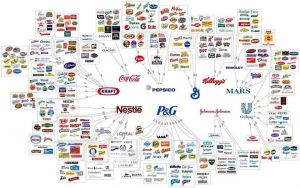Corporation


A traditional corporate entity is a collective of people joined together by articles of incorporation in pursuit of profit. Although it may be comprised of individual parts such as directors, officers, and shareholders, a corporation is a legal entity in and of itself. This was determined by Santa Clara County vs Southern Pacific Railway in the U.S. Supreme court in 1886[1]. This precedent setting case was a dispute over a railway route and determined whether the U.S. Supreme Court identified a private corporation as a “natural person” under the U.S. Constitution and therefore entitled to protection under the Bill of Rights.
Behaviour
The prime driver of all corporate entities is self survival. The second is their fiduciary duty to pursue revenue for the financial gain of employees and shareholders. These paramount, binding principles have been anthropomorphised with some authors[2] arguing that corporate entities have the characteristics of a psychopath.
Research has found people with narcissistic traits tend to get promoted 39% faster in their progression to CEO[3] and that there are at least three times as many psychopaths in executive or CEO roles than in the overall population[4] . The importance of this fact is emphasised by the knowledge that psychopaths, at around 1% of the adult population, are reported to be responsible for about 50 % of all serious crimes and constitute 20% of (North American) prison populations[5].
Corporates, however are not humans, only inert machines, much like a gun, its behaviour is only defined by the intention behind it. Change the intention, change the effect. Can we write a series of ethical tenets which would then enable the creation of an incorporation statement which could change this?
References
- ↑ U.S. Supreme Court (1886): Santa Clara County v. Southern Pacific R. Co., 118 U.S. 394. Decided: May 9, 1886. Accessed 6th Jan 2022 via https://supreme.justia.com/cases/federal/us/118/394/
- ↑ Bakan, Joel, The Corporation: The Pathological Pursuit of Profit and Power. New York: Free Press, 2004.
- ↑ The Leadership Quarterly: The perks of narcissism: Behaving like a star speeds up career advancement to the CEO position. Published June 2021, Accessed 14th January via https://doi.org/10.1016/j.leaqua.2020.101489
- ↑ Corporate Psychopathy: Talking the Walk
- ↑ Hare, R. (1999). Without conscience: The disturbing word of the psychopaths among us. New York: Guildford Press.